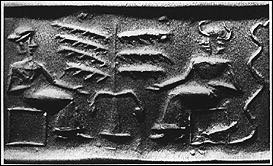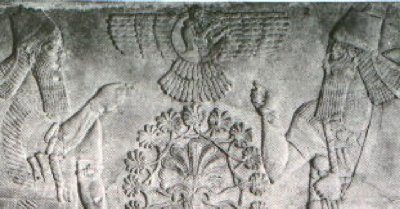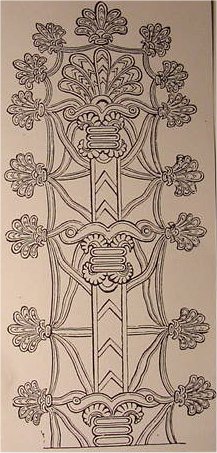

| Nachdem sich Himmel und Erde voneinander getrennt hatten und die Menschheit geschaffen war, nachdem das Himmelsgewölbe ('Anucirculum'), Enlil (der Herr der Winde) und Ereskigal Besitz ergriffen hatten vom Himmel, der Erde und der Unterwelt, nachdem Enki seine Segel gesetzt hatte für (die Reise in) die Unterwelt |
|
| und sich das Meer in Ebbe und Flut zur Ehre des Herrn bewegte, |
|
| an diesem Tage wurde ein Huluppu-Baum, der an den Ufern des Euphrats gepflanzt war und genährt wurde von seinem Wasser, durch den Südwind entwurzelt und trieb auf dem Flusse davon. |
|
|
|
|
|
Eine Göttin, die
entlang des Ufers wanderte, erkannte den sich wiegenden Baum und -- auf Geheiß
von Anu dem Gott im Himmel, und Enlil, dem Herrn der Winde -- brachte sie ihn in
Innana's Garten in Uruk.
|
|
|
Inanna pflegte den Baum sorgfältig |
|
| und liebevoll hoffte sie, daß sie von diesem Baum einen Thron und ein Bett nur für sich allein erhielt. |
|
| Nach zehn Jahren war der Baum gereift. |
|
|
Aber in der Zwischenzeit, stellt
sie zu ihrem Schrecken fest, daß sich ihre Hoffnungen nicht erfüllen würden,
weil während der Zeit ein Drachen sein Nest am Fuße des Baumes gebaut hatte.. |
|
|
Der
(Zu-)Vogel zog seine Jungen auf in der Baumkrone |

|
|
und der weibliche Dämon Lilith
hatte ihr Haus in der Mitte (des Baumes). |
|
|
Aber Gilgamesch, der von Inanna's
Notlage gehört hatte, kam zu ihrer Rettung. |
|
| Der (Zu-)Vogel floh in die Berge mit seinen Jungen, während Lilith, versteinert durch Angst ihr Haus abriss und in die Wüste floh |
|
|
|
|

| In days of yore, in the distant days of yore,
In nights of yore, in the far-off nights of yore,
In days of yore, in the distant days of yore,
after in days of yore all things needful had been brought into
being,
after in days of yore all things needful had been ordered,
after bread had been tasted in the shrines of the Land,
after bread had been baked in the ovens of the Land,
after heaven had been moved away from earth,
after earth had been separated from heaven,
after the name of man had been fixed,
after An had carried off heaven,
after Enlil had carried off earth,
after Ereshkigal had been carried off into the nether world as
its prize.
After he had set sail, after he had set sail, after the father had set sail for the nether world, against the king, the small were hurled, against Enki, the large were hurled, its small stones of the hand, its large stones of the dancing reeds, the keel of Enki's boat, overwhelm in battle like an attacking storm, against the king, the water at the head of the boat, devours like a wolf, against Enki, the water at the rear of the boat, strikes down like a lion. Once upon a time, a tree, a huluppu, a tree -- It had been planted on the bank of the Euphrates, It was watered by the Euphrates -- The violence of the South Wind plucked up its roots, tore away its crown, the Euphrates carried it off on its waters. The woman, roving about in fear at the word of An, roving about in fear at the word of Enlil, took the tree in her hand, brought it to Erech: "I shall bring it to pure Inanna's fruitful garden." The woman tended the tree with her hand, placed it by her foot, Inanna (Venus) tended the tree with her hand, placed it by her foot. "When will it be a fruitful throne for me to sit on," she said, "When will it be a fruitful bed for me to lie on," she said. The tree grew big, its trunk bore no foliage, in its roots the snake who knows no charm set up its nest, in its crown the Imdugud-bird placed its young, in its midst the maid Lilith built her house -- The always laughing, always rejoicing maid, the maid Inanna -- how she weeps! As light broke, as the horizon brightened, As Utu (Sun) came forth from the "princely field," His sister, the holy Inanna (Venus) says to her brother Utu (Sun): "My brother, after in days of yore the fates had been decreed, after abundance had sated the land, after An had carried off heaven, after Enlil had carried off earth, After Ereshkigal had been carried off into the nether world as its prize. After he had set sail, after he had set sail, after the father had set sail for the nether world, against the king, the small were hurled, Against Enki, the large were hurled, its small stones of the hand, iIts large stones of the dancing reeds, the keel of Enki's boat, overwhelm in battle like an attacking storm, against the king, the water at the head of the boat, dDevours like a wolf, aAgainst Enki, the water at the rear of the boat, sstrikes down like a lion. Once upon a time, a tree, a huluppu, a tree -- it had been planted on the bank of the Euphrates, it was watered by the Euphrates -- The violence of the South Wind plucked up its roots, Tore away its crown, The Euphrates carried it off on its waters. The woman, roving about in fear at the word of An, Roving about in fear at the word of Enlil, Took the tree in her hand, brought it to Erech: ‘I shall bring it to pure Inanna's fruitful garden.' The woman tended the tree with her hand, placed it by her foot, Inanna (Venus) tended the tree with her hand, placed it by her foot, ‘When will it be a fruitful throne for me to sit on,' she said, ‘When will it be a fruitful bed for me to lie on,' she said. The tree grew big, its trunk bore no foliage, iIn its roots the snake who knows no charm set up its nest, in its crown the Imdugud-bird placed its young, in its midst the maid Lilith built her house -- The always laughing, always rejoicing maid, I, the maid Inanna, how I weep!" Her brother, the hero, the valiant Utu (Sun), stood not by her in this matter. As light broke, as the horizon brightened, As Utu (Sun) came forth from the "princely field," His sister, the holy Inanna, (Venus) speaks to the hero Gilgamesh: "My brother, after in days of yore the fates had been decreed, after abundance had sated the land, after An had carried off heaven, after Enlil had carried off earth, after Ereshkigal had been carried off into the nether world as its prize -- after he had set sail, after he had set sail, after the father had set sail for the nether world, against the king, the small were hurled, against Enki, the large were hurled, iIts small stones of the hand, iIts large stones of the dancing reeds, the keel of Enki's boat, overwhelm in battle like an attacking storm, against the king, the water at the head of the boat, devours like a wolf, against Enki, the water at the rear of the boat, strikes down like a lion. Once upon a time, a tree, a huluppu, a tree -- iIt had been planted on the bank of the Euphrates, iIt was watered by the Euphrates -- The violence of the South Wind plucked up its roots, tore away its crown, the Euphrates carried it off on its waters. The woman, roving about in fear at the word of An, roving about in fear at the word of Enlil, took the tree in her hand, brought it to Erech: ‘I shall bring it to pure Inanna's fruitful garden.' The woman tended the tree with her hand, placed it by her foot, Inanna tended the tree with her hand, placed it by her foot, ‘When will it be a fruitful throne for me to sit on,' she said, ‘When will it be a fruitful bed for me to lie on,' she said. The tree grew big, its trunk bore no foliage, in its roots the snake who knows no charm set up its nest, in its crown the Imdugud-bird placed its young, in its midst the maid Lilith built her house -- the always laughing, always rejoicing maid, the maid Inanna, how I weep!" Her brother, the hero Gilgamesh, Stood by her in this matter, He donned armor weighing fifty minas about his waist -- Fifty minas were handled by him like thirty shekels -- His "ax of the road" -- Seven talents and seven minas -- he took in his hand, at its roots he struck down the snake who knows no charm, in its crown the Imdugud-bird took its young, climbed to the mountains, in its midst the maid Lilith tore down her house, fled to the wastes. The tree -- he plucked at its roots, tore at its crown, tThe sons of the city who accompanied him cut off its branches, He gives it to holy Inanna for her throne, Gives it to her for her bed, She fashions its roots into a pukku for him, fashions its crown into a mikku for him. The summoning pukku -- in street and lane he made the pukku resound, the loud drumming -- in street and lane he made the drumming resound, the young men of the city, summoned by the pukku -- bBitterness and woe -- he is the affliction of their widows, "O my mate, O my spouse," they lament, who had a mother -- she brings bread to her son, who had a sister -- she brings water to her brother. After the evening star had disappeared, and he had marked the places where his pukku had been, he carried the pukku before him, brought it to his house, at dawn in the places he had marked -- bitterness and woe! Captives! Dead! Widows! Because of the cry of the young maidens, his pukku and mikku fell into the "great dwelling," he put in his hand, could not reach them, put in his foot, could not reach them, he sat down at the great gate ganzir, the "eye" of the nether world, Gilgamesh wept, his face turns pale: . "0h my pukku, my mikku, my pukku with zest irresistible, with rhythm irrepressible - if only my pukku bad once been in the carpenter's hause, if only it had been with the carpenter's wife, like the mother who gave birth to me, if only it had been with the carpenter's child, like my little sister - My pukku, who will bring it up from the nether world! My mikku, who will bring it up from the nether world!" Enkidu, bis servant, says to him: "My master, why do you weep! Why is your heart grievously sick! I will bring up your pukku from the nether world, I will bring up your mikku tram the 'eye' of the nether worldl" Gilgamesh says to Enkidu: "If now you will descend to the nether world, A word I speak to you, take my ward, Instruction I offer you, take my instruction: |